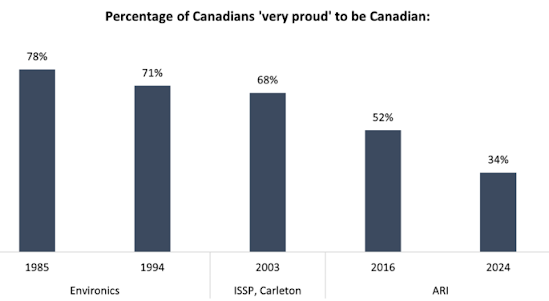Buy Canadian - It's Not So Easy
The term "maple-washing" appeared in a headline and it is our subject for today. It was new to me. Apparently "it has been coined in popular discourse to describe the lengths that retailers and producers have gone to make their products appear as Canadian as possible."
Misleading marketing is not new, but the surge in food patriotism is and that has led to some questionable labelling indicating that a product is "Canadian". To reduce the angst among those who are agitated about all of this, I will reproduce the relevant paragraph from the maple-washing article, which says the rules relating to food are clear about what constitutes "Canadian." I hope they are clear to you, but I remain confused. For example, although coffee is not grown in Canada, I know there are some Canadian coffee companies, as defined by the rules listed below, but I don't think it would be correct to say that Tim Hortons is a Canadian company.
"According to the Food and Drugs Act, all food labels must be truthful and not misleading or likely to create a false impression. The rules are clear.
"Product of Canada" requires that at least 98 per cent of the ingredients and processing be Canadian. "Made in Canada" means the last substantial transformation took place here, and "Prepared in Canada" refers to food that was processed, packaged or handled domestically, regardless of where the ingredients originated." "Retailers Must Guard Against Maple-Washing," Sylvain Charlebois, London Free Press, July 29, 2025.
To demonstrate the complexity of all of this, here is a bit from the Consumers Council of Canada, which also supplied me with the definition of maple-washing as quoted above.
"In one typical social media feed, Canadians can see promotion that Cadbury’s Creme Eggs and Mini Eggs are “proudly made for Canada, in Canada from domestic and imported ingredients”, Breyer’s ice cream is “made in Canada with high quality ingredients and Canadian dairy”. Black Diamond cheese will also promote its Canadian origins and production, and sometimes cheekily notes it is made with 0% American cheese.
Some consumers will appreciate this presentation and favour those products.
Of course, Cadbury is a British company, owned by Mondelez international. Breyers has a production facility in Simcoe, Ontario, but it’s owned by Unilever. Black Diamond has origins and production in Belleville, Ontario, but is owned by Lactalis Canada which is part of the Lactalis Group, headquartered in France."
I suppose that the subject of whether your grocery item is "Canadian" is moot if you purchased it at either Walmart or Costco.
Buy Ontarian
Once again, my post is more confusing than it should have been. So, I will conclude by suggesting that you only buy things made in Ontario and supply the source where you can shop: Ontario Made: Great Things are Made Right Here. You will even find a Canadian coffee company - Club Coffee Craft Roasters, in Etobicoke.
Post Script:
The recent concern about buying Canadian is largely a result of the numerous tariffs which have been levied, unlevied and which are about to be levied again. Ontario began the "Support Ontario" program back when the pandemic was the issue that made people think about reshoring and producing things locally.
See, for example: "Labatt Promotes Ontario Made Label," Jennifer Bieman, LFP, Oct. 30, 2020:
"Labatt Breweries of Canada signed on to a provincewide push to promote Ontario businesses forging ahead in the pandemic-battered economy. Ninety-six brands, including London-made Bud Light, Budweiser and Labatt Blue, will display an Ontario Made designation, a marketing initiative to promote local products....The province threw its support behind the program in early July, contributing $500,000. The campaign comes after many Ontario businesses retooled during the first wave of the pandemic to manufacture in-demand products, including masks and other personal protective equipment. Premier Doug Ford announced a second phase of the program Thursday, a consumer directory of participating manufacturers at Supportontariomade.ca."
Bonus Links:
Send your kid to a Canadian Maple League University.
Travel Locally- Grassroutes.
Whether a non-food item is "Canadian" can be complex as well, and that is why we have law firms. And when such firms are involved, suits follow. Take the case of a company named Moose Knuckles, which surely appears to be Canadian, even if their product was not.
"In recent years, there has only been one enforcement action brought by the Bureau regarding a “Made in Canada” claim. In 2016, the Bureau filed an application with the Competition Tribunal (Tribunal) alleging that Moose Knuckles had marketed their winter parkas as “Made in Canada,” when they were actually imported from Asia in nearly finished form, only to be finalized with zippers, snaps, fur trims and labels in Canada. Moose Knuckles settled the action by, among other things, agreeing to donate C$750,000 over five years to charity and to clarify that some of its parkas are made with Canadian and imported components."
From: "Maple-Washing: Regulatory and Civil Liability Risks of Calling a Product Canadian," By Laura Weinrib, Jonathan Bitran, Simon Seida, Emily Hazlett and Joshua Hutchinson, Blake, Cassels & Graydon LLP, March 13, 2025.
For another bonus, search for the meaning of "moose knuckles".













